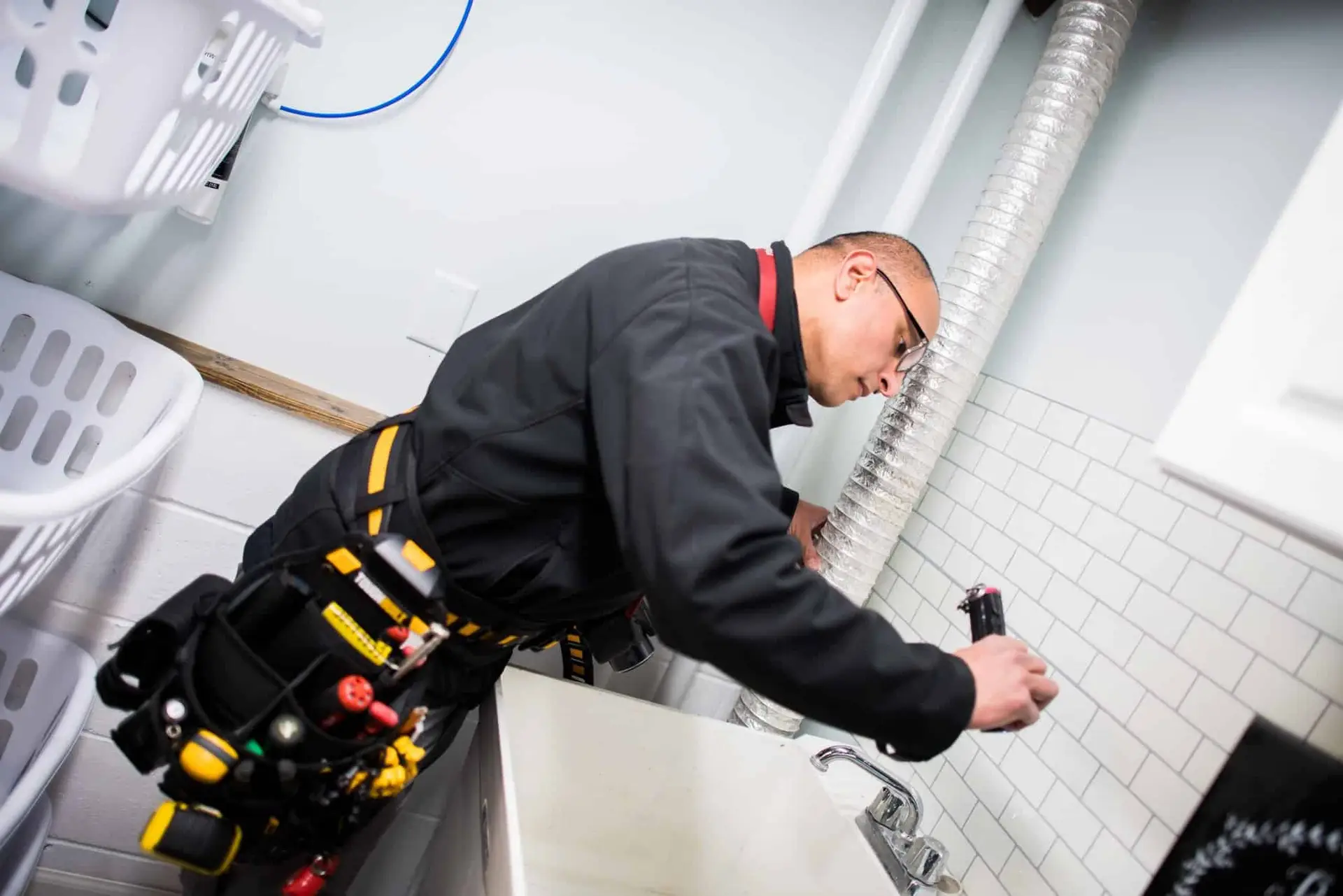Home inspectors provide a detailed report regarding the condition of a property. While this service helps buyers and sellers complete a transaction, there are certain things that home inspectors are not allowed to do.
Whether it’s the value of a property or identifying specific hazards, there is a limit to what home inspectors can do while on a job. Knowing what a home inspector can and can’t do can help you manage your expectations of a home inspection and understand who to hire if you need additional services.
What is the home inspection process?
A home inspection is a visual examination of a property that aims to identify defects in its structure, materials, and various systems, as well as any safety issues that might not be immediately apparent.
Since some home inspection regulations vary by state, as well as local laws, this is not a comprehensive list but more of a tentative guide that can give you an overview of the basic things that lie outside of your home inspectors’ scope of work.
If you have additional questions about what home inspectors are not allowed to do, consult with your local home inspection authorities and governing bodies. They can provide you with a detailed overview of what home inspectors are not allowed to do, based on your state and local regulations.
So what are home inspectors not allowed to do?

Performing home repairs
Home inspections should be performed only by a licensed professional affiliated with a home inspection company.
A home inspector’s job is to point out areas that need attention or repair. However, they cannot make these repairs while inspecting the property.
Providing a referral for home repairs is frowned upon by some home inspectors, but if a home inspector refers you to a different company, they are not violating any laws, unless it goes against local and state laws.
Once you have your inspection report, you can use that information to determine who you would need to hire.
Why home inspectors shouldn’t perform home repairs for clients
A home inspector is limited as to what services they can provide by their professional license. While a home inspector is not going to break the law by referring you to electrical or plumbing services, a home inspector could lose their license if they perform any home repairs while on the job.
As a homeowner, you can check your local publications, ask family members, or go online to find the repair services. For example, if a home inspector tells you that your home’s electrical system needs attention, it’s up to either the buyer or seller to find an electrician to fix it.
Are there any exceptions to the rule?
Sometimes, home inspectors offer standard tests for radon or mold – the most common issues that are checked during a home inspection. While this is a generally accepted practice, it is a good idea for home inspectors to offer a referral as an option, as this is still a gray area.
What can they do instead to help?
Home inspectors shouldn’t take any work from clients if they also run a separate business focused on home improvement or repairs. The InterNACHI code stipulates that they can take work from a previous home inspection client 12 months after a home inspection is complete to avoid ethics violations.

Inspect homes with safety hazards
If a home inspector identifies various safety hazards, they have to notify the buyer and seller immediately. However, if the home looks dangerous to enter or inspect safely from the outset, the inspector has no obligation to go inside.
Home inspectors typically can’t enter houses with obvious safety hazards. The seller should take care of these issues before listing the home, or at least before allowing buyers to use the services of a home inspector.
Why home inspectors shouldn’t inspect homes with safety hazards
It’s not safe. A homeowner could face a liability if a home inspector gets hurt while doing their job.
What to do if a home looks unsafe to enter
If a property is unsafe, a home inspector could return later to complete it, as long as homeowners resolve the outlined safety issues. If there are major safety hazards, a homeowner has to address them right away and inform the agent or anybody else involved in the process.
Different states also have their own laws and regulations that stipulate what to do if a property has safety hazards, so it’s a good idea to review local laws carefully.
Are there any exceptions to the rule?
No. If a property looks unsafe to inspect, a home inspector doesn’t have to go inside. Home inspectors should always use discretion, and stay away if a home looks like a safety hazard.
Speculating on potential hazards
Issues like radon, asbestos and even mold are serious red flags for home buyers. One of the things that a home inspector is not allowed to do is to make assumptions about specific hazards if they don’t perform any official tests.
While home inspectors should note visible signs of mold, they can’t indicate the presence of certain things in a home report without prior testing. A home inspector can still say in a report that there is an indication of things like past or present water damage and other issues if they are apparent during the inspection process.
Why home inspectors shouldn’t speculate on potential hazards
Hazardous materials like asbestos, lead, radon and even mold can be dangerous and expensive to remove. The best way for them to protect themselves from liability is to refrain from making any comments about the extent of the damage.
What can they do if something looks like a hazard?
Home inspectors can encourage homeowners to do a professional inspection, if your report indicates presence of any damage or other issues. Only a professional lab inspection can give a clear verdict on these things.
Are there exceptions to this rule?
While radon, asbestos and lead call for specialized testing, mold can be easily identified through a visual inspection. If an inspector finds mold during a home inspection, it’s fair to let home owners know about it, since mold doesn’t always require professional treatment.
Noting a home’s value
A home inspector’s job is to provide insight into the condition of a home and its systems, as well as identify any issues that might not be obvious. Home inspectors are not allowed to give home buyers and sellers any insight into the market value of their property.
If a buyer wants to learn more about the value of a property, they should hire a real estate appraiser. Consult with your realtor if you want to determine the value of a property in which you are interested.
Why home inspectors shouldn’t comment on a home’s value
Although they will not lose their license or get in legal trouble by commenting on a property’s value, they’ll most likely raise some eyebrows. If they want to stay on good terms with clients, they’ll likely stay away from making comments about properties’ market value when inspecting them.
Can they offer any other insights on property’s value?
The results of a home inspection have a direct impact on a property’s market value, so it’s better that they stay away from making comments about a property’s price. That being said, they can always address general questions about how certain things outlined in a home inspection report can affect the overall value of a property.
Are there exceptions to this rule?
Home inspectors should stay away from speculating, but if a property has serious issues, they should bring them to home owners’ attention.
Estimating life expectancy of home systems
While home inspectors can note the current condition of home systems, they are not allowed to provide an estimate of their life expectancy.
A home inspector’s job is to provide information about current conditions and not make predictions. If you’re concerned about the state or lifespan of a system such as HVAC, you should hire a professional from that industry to help identify any potential issues.
Why home inspectors shouldn’t offer estimates of a home system’s life expectancy
Home inspectors can determine the current state of different home systems, however, they shouldn’t make any predictions about how long these systems will last or when they need to be replaced. Since they are not specialists, their prediction is not a guarantee, and it can get them in legal trouble if a home system causes any damage after it’s replaced.
Can they offer any estimates on a specific system?
When inspecting different systems of the home, home inspectors will simply note the current state and answer any questions that a homeowner may have. A home inspector may be able to give you an idea of how much that system would cost if it needed replacement.
Are there exceptions to this rule?
Since they are not a licensed repair specialist, they can’t offer any insight on how long a specific system will last. They may advise a homeowner to contact a licensed professional to make a proper assessment of specific home systems.
Speculating on local building codes
Home inspectors are not allowed to speculate on whether or not parts of a home were completed according to local building codes. These codes change constantly, and there’s no way for the inspector to know whether or not any parts of your home were built according to local building codes at the time of construction.
While your home should always meet local building codes, a home inspector cannot determine whether the property is following local guidelines.
Why home inspectors shouldn’t speculate on home building codes
While they are not likely to get sued for speculating on local building codes, it may create a lot of discomfort and anxiety for clients who already have a long list of things to worry about.
What can they do instead to offer advice for their clients?
Home inspectors should stay away from making comments about local building codes, and if a homeowner asks you any questions, refer them to a building code expert to get their questions answered.
Keep in mind that building code violations don’t necessarily have to be reported or fixed before selling a property, unless they affect safety and other critical components.
Are there exceptions to this rule?
Not many homeowners are knowledgeable about home building regulations, so home inspectors can talk about code compliance in a more informal language, which often helps home buyers. Remember that anything that is put in a home inspection report could have consequences for clients.
Speculating on insurability of a property
Just like home inspectors are not allowed to make assumptions about whether your property meets local building codes, they also can’t speculate on the insurability of your home.
Even if the inspector notes a variety of issues, they’re not allowed to tell you whether or not they think you’ll have problems insuring your property. Only a professional insurance agent or adjuster can decide if a home is insurable. If you’re concerned about the insurability, have an agent come to the property and take a closer look before you make an offer.
Why home inspectors shouldn’t speculate on the insurability of a property
Home inspectors are not allowed to comment on the insurability of a home. This area lies outside their scope of expertise, and could create a liability for them by making these comments.
What can they do instead to help home buyers understand how insurable a property is
While they can’t make any comments or try to determine how insurable a property is, they can collect information via their inspection that will help an insurance company make this decision.
Are there exceptions to this rule?
No, there are no exceptions to this rule. The best option home inspectors have is to empower their clients with information so they can have a productive discussion with a local insurance agent.
Moving furniture during an inspection
Home inspectors are not allowed to move furniture, vehicles, or other heavy objects during the inspection.
This also applies to snow and ice, which may get in the way of the inspector safely accessing the home. Sellers should ensure a safe, clear path for inspectors before scheduling an inspection. This includes both the inside and outside of the property as well as the attic and basement, when applicable. If the home inspector cannot reach certain areas, they will note that on the report or reschedule the inspection.
Moving furniture could create liabilities for the inspector
Home inspectors can face the risk of liability if they move furniture or other personal items during a home inspection. For example, moving furniture during a home inspection could damage it as well as scratch the floor. Moving heavy pieces of furniture could also cause injuries and invite trouble for all parties involved in the home inspection process.
Decorative objects like carpets, rugs, pictures hanging on the walls and house plants are not required to be moved during the inspection.
Can home inspectors move small furniture?
If a certain area is blocked by small furniture or other objects, iIf a certain area is blocked by small furniture or other objects, inspectors may ask homeowners to move it out of the way. If it can’t be done, they’ll likely stay away from the area, and may reschedule the inspection for a different time.
Are there exceptions to this rule?
Moving items often requires a homeowners’ discretion. Some items can be moved as long as the homeowner is present and gives their permission to the inspector.
Remember that home inspectors are a guest in somebody else’s home and will treat their property with the utmost respect. Home inspectors will always ask questions when they need access to a certain area before touching or moving anything.
Identifying property lines
A home inspector is not allowed to identify or determine property lines, boundaries, or easements. If you want to find out exactly where the property lines are, hire a land surveyor. Most local jurisdictions have information about the property lines on file, and you can access it by making a request. Consult with your local tax department or department of revenue to find out if they have this information available.
Why home inspectors can’t identify property lines
A home inspector is not qualified to provide any information on property lines as well as other elements of a property’s physical boundaries. Doing so could cause a home inspector to lose their license.
Can they offer any insight on a property’s boundaries?
The only insight a home inspector can provide about property boundaries is how a potential buyer can access that information on their own. If a client asks a home inspector to identify a property line during a home inspection or asks where it might be located, they’ll likely politely tell them that they are not qualified to do so, and suggest hiring a professional land surveyor or contacting their local jurisdiction.
Are there exceptions to this rule?
Home inspectors’ area of expertise lies outside of identifying properties’ lines. There are no exceptions to this rule, as their job is to provide a report on the condition of a home, not outline its physical boundaries.

What risks do inspectors take by offering advice outside of their area?
If your home inspector provides advice that lies outside of their scope of expertise or performs a service that they are not allowed to, this could result not only in their termination and loss of license but also create potential issues for home buyers and sellers.
Always check if you have doubts whether a home inspector is allowed to do certain things and consult with the right professional if you need additional services following a home inspection.
A final word on what home inspectors are not allowed to do
Home inspectors are trained professionals who can help you determine the condition of a home.
While home inspectors can do many things to ensure a quality home inspection, there are also certain things that they are not allowed to do. Consult with a land surveyor, realtor, or other professionals if you have additional questions about a property.
Nevertheless, a home inspection with a trained, knowledgeable home inspector should always be a part of the home buying process. If you’re a home inspector and need comprehensive software that can help you time and money, sign up for your free trial with the Inspection Support Network today.

